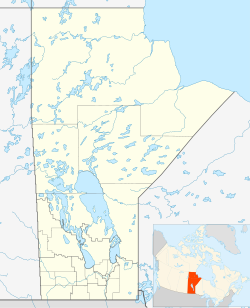This article needs additional citations for verification. (March 2008) |
Snow Lake is a town in Manitoba, Canada, located 685 km (426 mi) north of Winnipeg at the end of Provincial Road 392. The main industry is, and always has been, mining; currently with one mine producing Zinc, and another lithium. The official Town of Snow Lake is a very large, overwhelmingly rural area that is centered about the urban community of Snow Lake, which lies very near its geographical center. The Town is as large in area as a typical rural municipality in the more southern parts of Manitoba.
Snow Lake | |
|---|---|
| Coordinates: 54°52′53.05″N 100°1′21.68″W / 54.8814028°N 100.0226889°W | |
| Country | Canada |
| Province | Manitoba |
| Region | Northern |
| Founded | 1947 |
| Incorporated | 1976 |
| Government | |
| • Mayor | Ron Scott |
| • MLA | Tom Lindsey |
| Elevation | 271 m (890 ft) |
| Population (2021) | |
• Total | 1,088 |
| Time zone | UTC-6 (Central (CST)) |
| • Summer (DST) | UTC-5 (Central (CDT)) |
| Postal code | |
| Area code | 204 |
| Website | Town of Snow Lake |
Possibly named for a local family (Rudnyckyj) or because early settlers "found the water in the lake as soft as the melted snow" (Files, Manitoba Department of Natural Resources).[1]
Mining
editMining always has been[clarification needed] Snow Lake's major industry. Two separate mining ventures have operated in the community over the past 40 years. TVX/Kinross/High River operated the New Britannia Mine, which closed in January 2005, and HudBay Minerals, which operated 12 area mines. They were/are Lalor Mine, Chisel Lake, Stall Lake, Osborne Lake, Dickstone, Anderson Lake, Ghost Lake, Lost Lake, Spruce Point, Rod Mine, Photo Lake, and Chisel North.
Following a rise in demand, lithium has begun to attract mining companies to the area. Nasdaq listed Snow Lake Lithium ($LITM) are currently (at Jan 2022) preparing to start commercial lithium mining.
Tourism
editNature lovers will delight[weasel words] in the numerous species of birds, animals and vegetation found along the region's many area hiking trails. Picking strawberries, raspberries, blueberries, or gooseberries is also a favourite summer pastime. History enthusiasts can explore ancient Aboriginal pictographs that are approximately 1500 years old.
Fishing and boating are popular activities with the presence of many lakes and rivers, such as Snow Lake, Wekusko Lake and the Grass River that have abundances of northern pike, walleye, and perch. The Grass River Route will provide outdoor enthusiasts with an insight into the life of the early voyageurs and fur traders.
In the winter months, local hiking paths double as cross-country ski trails, while miles of frozen lakes and rivers in the area provide endless trails for snowmobilers. Ice fishing is popular as well.
The town of Snow Lake also is home to a hockey arena, curling rink, 9-hole golf course and several other recreational facilities which play host to a number of activities and tournaments over the course of the year.
On September 22, 2014, MTS launched 4G HSPA telephone service in the community and surrounding area.
Demographics
editIn the 2021 Census of Population conducted by Statistics Canada, Snow Lake had a population of 1,088 living in 473 of its 604 total private dwellings, a change of 21% from its 2016 population of 899. With a land area of 1,166.64 km2 (450.44 sq mi), it had a population density of 0.9/km2 (2.4/sq mi) in 2021.[2]
| 2016 | 2011 | |
|---|---|---|
| Population | 899 (24.3% from 2011) | 723 (-13.6% from 2006) |
| Land area | 1,211.89 km2 (467.91 sq mi) | 1,211.89 km2 (467.91 sq mi) |
| Population density | 0.7/km2 (1.8/sq mi) | 0.6/km2 (1.6/sq mi) |
| Median age | 47.4 (M: 48.2, F: 44.2) | 48.4 (M: 49.0, F: 48.3) |
| Private dwellings | 498 (total) | 526 (total) |
| Median household income | $44,480 |
Education
editJoseph H. Kerr School, the lone educational facility in Snow Lake, is a Kindergarten to Senior Four facility with an enrollment of 145 students for the 2008–2009 school year. It is now part of the Frontier School Division. Prior to a Provincial amalgamation (2003) of school districts, it operated under its own district, the School District of Snow Lake # 2309. The building, under one form or another, has been open for close to fifty years. In 2001, Joseph H. Kerr was named one of the thirty most innovative schools by Canada's Schoolnet.
Local media and services
editRadio
edit- NCI - 96.3
- CBC - 95.5
Television
editCBWKT connected to the province-wide microwave system on March 1, 1969.[7]
References
edit- ^ Hamilton, William (1978). The Macmillan Book of Canadian Place Names. Toronto: Macmillan. p. 64. ISBN 0-7715-9754-1.
- ^ "Population and dwelling counts: Canada, provinces and territories, and census subdivisions (municipalities), Manitoba". Statistics Canada. February 9, 2022. Retrieved February 20, 2022.
- ^ "2016 Community Profiles". 2016 Canadian census. Statistics Canada. August 12, 2021. Retrieved 2021-05-13.
- ^ "2011 Community Profiles". 2011 Canadian census. Statistics Canada. March 21, 2019. Retrieved 2021-05-13.
- ^ "2006 Community Profiles". 2006 Canadian census. Statistics Canada. August 20, 2019.
- ^ "2001 Community Profiles". 2001 Canadian census. Statistics Canada. July 18, 2021.
- ^ "Microwave Hook-Up Gives North Live TV". Winnipeg Free Press. April 29, 1969. p. 28.
External links
edit
